Oncologists face a difficult task with pancreatic cancer. Its aggressive nature as well as the fact that it’s often diagnosed at a late stage makes this a difficult disease. As researchers continue to delve into the complexities of this disease, questions arise regarding its cause of genetic predispositions and genetic causes, prevention strategies, and the help available through pancreatic cancer charities.
Are Pancreatic Cancers Genetic?
One of the major questions concerning pancreatic cancer focuses on the genetic element. A small portion of pancreatic cancer cases have been associated with genetic mutations. The majority of cases of pancreatic cancer are believed to be sporadic (meaning that they do not appear to be hereditary) However, a few percent of cases may actually be inherited. Some genetic syndromes such as mole melanoma that is atypically familial, Lynch syndrome and hereditary melanoma are associated with an increased risk of developing pancreatic cancer. Additionally, mutations in genes like BRCA1, BRCA2, PALB2, and ATM have been linked to familial pancreatic cancer cases. Understanding the genetic underpinnings of pancreatic tumors not only helps to understand its causes but also aids in screening and risk assessment strategies for people at risk.

Pancreatic Cancer Prevention
A diagnosis of pancreatic cancer can be a grim one thus efforts to prevent it are essential. While some risks, such as age and gender, race and the history of family members, are not within one’s control however, there are lifestyle adjustments that can lower the risk. A reduced risk of pancreatic cancer has been attributed to a number of factors, such as stopping smoking and maintaining a healthy diet, and also limiting alcohol and eating fruits, vegetables and cereals. Individuals with a history of pancreatic disease or genetic predispositions may benefit from genetic testing and counselling to assess their risk. By addressing risk factors that are modifiable and encouraging early detection via monitoring in populations at risk, strides can be made in preventing the development of pancreatic cancer and improving the outcomes.
Pancreatic Cancer: Causes and Treatment
Knowing the root causes of pancreatic cancer is crucial to developing effective prevention and treatment strategies. Although the precise mechanisms that underlie pancreatic carcinogenesis remain unclear but a variety of risk factors have been recognized. Smoking is one of the main risk factors for pancreatic cancer, accounting for 20-30 percent. Chronic pancreatitis, a condition characterized by inflammation in the pancreas has been identified as a pre-cursor to pancreatic tumors. Obesity, diabetes, and certain dietary factors, such as red meats and processed animal products are also linked to an increased likelihood of pancreatic carcinoma. The risk of pancreatic cancer can be reduced by addressing the risks and taking preventive measures.
Pancreatic Cancer Charity Beacon of Support
Faced with the difficulties faced by pancreatic cancer the importance of pancreatic cancer charities cannot be understated. These organizations are invaluable resources for assistance, education and advocacy to caregivers, patients and healthcare professionals. Pancreatic cancer charities provide variety of services including support and financial assistance. They also offer information resources and clinical trials. These organizations play an essential role in raising awareness about pancreatic cancer, and in promoting the early detection of. They additionally advocate for increased funding for research and better patient care. Pancreatic Cancer Charities aim to make a difference in the fight against pancreatic cancer by fostering community engagement and collaboration. Visit Prevent pancreatic cancer
Pancreatic Cancer: A Landscape View
The pancreatic cancer is a multifaceted problem which requires a broad approach that incorporates genetic knowledge, prevention strategies, and assistance provided by Pancreatic cancer charity. In order to prevent pancreatic cancer, the primary focus is on reducing the risk and early detection of high-risk people. Pancreatic cancer can be reduced by addressing the main causes and using the resources provided by pancreatic organizations. As research continues to progress and awareness is raised and awareness increases, there is a chance for a brighter future in the fight against pancreatic cancer.